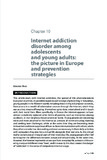| dc.description.abstract | This article deals with Internet addiction, the spread of this phenomenon in European countries, its possible causes as well as ways of preventing it. Nowadays, young people in the Western world, including those living in European societies, have access to a wealth of information sources through the Internet, which they use as a key means of keeping themselves up to date, entertained and in touch with their social lives. More specifically, in Greece the Internet appears to have almost completely replaced other forms of pastime, such as interactive playing outdoors, in the neighborhood or/and at home. Young people are becoming more and more attached to the Internet as a means of communicating, learning and seeking new challenges, while at the same time they are becoming more introverted and more suspicious of face‑to‑face communication with others, which they often consider too demanding and even unnecessary. In their daily activities with computers they also live a virtual life alongside their real one. As this virtual reality constitutes an integral part of their everyday life, young people often fail to recognize the differences between actual and virtual reality. At the same time, however, the Internet represents an escape from everyday life, a means of discovering many and different new “lives”, and it is exactly this that creates the danger of “addiction” in the sense of compulsive Internet usage. | en_UK |


